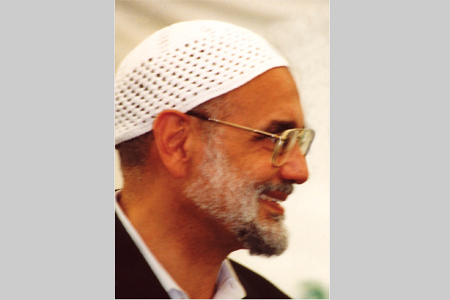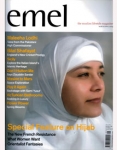
On Mount Nur with Dr Jamal Badawi
Issue 4 Mar / Apr 2004
Eid-ul-Adha has again come and passed. Millions of pilgrims have taken the journey of a lifetime to the House of God, rebuilt by the prophet Abraham. The valley of Makkah still resonates with the yearning of their souls to be closer to their Creator. As the hearts of the pilgrims are still overfilled with the life-shattering experiences of Hajj, we ask another spiritual traveller to take an imaginary journey to the nearby Mount Nur and share with us his spiritual reflections and life journey.
He is Dr Jamal Badawi, lecturer in both management and Islamic studies at Saint Mary’s University in Canada. In his more public role as a renowned speaker on Islam, Dr Badawi is perceived as a soft-spoken man of overwhelming modesty, yet his humility and calmness belies his strength to profoundly change the hearts and minds of those who have seen him or heard him. The power of his speech and quiet exemplary manner is an illuminating light that shatters the darkness of ignorance and confusion.
On Mount Nur is an imaginary journey of spiritual enlightenment, what unique experience initiated your life journey as a seeker and sharer of knowledge?
The foundation was laid in my childhood. I grew up in a family that was moderately religious, where both my parents prayed, but my mother was more devoted. The atmosphere was natural and without pressure, and it was entirely my own decision to fast at the age of five. At six I would go to the mosque and everyday after Maghrib prayer, the imam would give talks and I would sit by his feet, mesmerised by what he said. He spoke on many topics but always in a simple and lucid way. He was surprised that I would rather listen to him than play with the other kids. He loved me as a son and was an influence on my life for many years.
What book or person has been most influential to your life?
I have read many books, but Hasan Al-Banna, founder of the Muslim Brotherhood, has been most inspirational. In his short life he visited over three thousand villages in Egypt, preaching Islam in a comprehensive yet moderate way, thus re-igniting the spiritual passion in people’s heart. Since his assassination in 1949, at the age of forty-three, his ideas have been widely adopted beyond the boundaries of his homeland by millions. More than any other individual, he has epitomised twentieth century Islamic thought and ideology.
As a fountain of knowledge to others, how do you replenish that resource?
I have been fortunate to have a job where I can learn as I teach, and the wider and the deeper I delve into topics, the more there is to discover. My quest for knowledge is not only driven by curiosity but often by burning questions. For instance, when I went to study at Indiana University in the States in the ‘60s, I realised that many Americans had no idea what Islam is or had an erroneous understanding of it. There was a desperate need to clarify many issues, but this had to be done with a greater understanding of their Christian background. As a result, I was driven to study about other faiths and deliver talks on comparative religion. I was very fortunate to be at an institution where there was a huge collection of Islamic books, many of which were primary sources, and used to try and finish my designated course study as soon as possible so as to devote as much time as possible to reading these extraordinary books.
If you were to choose three short selections from the Qur’an to take on this imaginary journey to Mount Nur, what would they be?
“Be mindful of Allah and Allah will give you knowledge... Anyone who has faith, Allah will guide them.”
Allah opens ways unexpectedly when we put our trust in Him. In 1979, at the time of the Soviet invasion of Afghanistan, I was asked to produce and present a series of half–hour programmes on Islam to be shown in the States and Canada. They were presented in a “Jibril method”, that is they were initiated by questions to which I would provide the answers. It is wholly the mercy of Allah that these programmes, commenced only as a short series, but alhamdulillah were so well received that now the series extends to over 350 programmes. As a further bounty from Allah, the research for these programmes formed a wonderful basis for self-education.
“…And if anyone puts his trust in Allah, Allah will suffice him…” (Sura 65; Verse 3)
The most pertinent example of this in my life is when I was appointed lecturer in Islamic studies at St. Mary’s where I had been teaching management studies. I have no degree training in Islamic studies and yet I was voted full professor de facto.
“…Verily the most honoured of you is he who is the most mindful of Allah…” (Sura 49; Verse 13) The most important thing is to be conscious of Allah. Our actions should be beyond the ritual, whether it is in our prayer or reciting the Qur’an. Heedlessness prevents us from reaping the true benefit of prayer and remembering Allah. All we would be weariness and strain for our troubles instead of closeness to our Creator.
What are the three Hadiths that you would take with you to Mount Nur and how would they nourish your soul and spirituality?
“None of you [truly] believes until he wishes for his brother what he wishes for himself.” (al-Bukhari and Muslim) Here is a reminder of the unselfishness of the Companions of the Prophet. Islam is not only based on sound belief but there should be a deep sense of brotherhood which is fundamental to the success of Islam as a way of life and the well-being of society.
“Actions are but by intention and every man shall have but that which he intended…” (al- Bukhari and Muslim) We live in a world where there is little time for reflection and our lives are often wrapped up in action and when our action earns us success in this life, we think it is our own doing and we do not remember that it is Allah who has granted us that success. Therefore, the intentions of our actions must be pure and we must constantly remind ourselves that we are nothing but for the grace of Allah. We should say ‘alhamdulillah’ from the heart and pray to Allah to keep us steadfast. “By Allah you will die in your sleep.” Here is a hadith that is both a reminder and a comforter. It is a reminder of the transience of this life but also a reassurance that any time of failing is in passing and that ultimately there is success for those who believe in Allah.
What would be your innermost thought on this spiritual journey?
An overwhelming sense of contentment and gratefulness to Allah. Allah has sufficed me in everything from my work to my family. He has blessed me with a job at the University that sustains my family and myself so that I may devote the rest of my time to dawa work on an unpaid basis and feel totally spiritually rewarded. He has blessed me with a wife who is always loving, patient, understanding and supportive. She has been my best critic and I always consult her when I prepare programmes. We are blessed with five children and fourteen grandchildren. I will spend my time on Mount Nur reflecting on Allah’s grace and remembering that I am nothing without Allah’s mercy.
As you complete your imaginary journey, how would you apply your reflections to the real world?
After September 11th, we all live in a more precarious world. There is an intellectual battle against not just Muslims but also Islam. The ‘cut and paste’ approach, i.e. picking out examples out of context from the Qur’an is very damaging to the integrity of Islam. Islam is portrayed in the media as an aggressive religion and many fundamental concepts are called into question or even ridiculed. There is an improper understanding of such issues as jihad and many have asked why the Prophet, peace be upon him, married so many wives. As Muslims, we cannot bury our heads in the sand; we must combat the prejudices and provide the answers. However, it is only with deep knowledge and understanding that we can hope to dispel misunderstanding and show that such horrific attacks as that on September 11th are completely un-Islamic. After all, peace and humanity are at the core of Islam.
Bookmark this |
|
Add to DIGG |
|
Add to del.icio.us |
|
Stumble this |
|
Share on Facebook |
|
Share this |
|
Send to a Friend |
|
Link to this |
|
Printer Friendly |
|
Print in plain text |
|


Comments
0 Comments